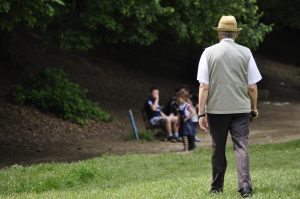The Importance of Feet as we Age

Over a lifetime our feet do a lot of work for us. On average, we take enough steps to walk around the earth about 5 times. That’s over 200 million steps. So, it’s no surprise that as we age our feet can start to feel the impact. Common issues affecting feet as we age include bone deformities such as arthritis, thinning of the fat pads under the feet, loss of elasticity in the skin, thickening nails,
diabetes and changes to strength and balance. As we age it can also become difficult to manage our own nail care due to deteriorating eyesight, arthritis in hands, hips and backs.
Regular podiatry care can help improve most foot problems by improving comfort and preventing complications such as fungus, foot pain, falls and ingrowing toenails. Feet can also be a good clue to your overall health and often systemic health conditions provide warning symptoms in the feet. The Australian Podiatry Association reports “signs of health conditions can be dry skin, brittle nails, burning and tingling sensations in your feet, or feelings of cold, numbness and discolouration.”
Your podiatrist can use simple, effective techniques and devices to effectively manage daily demands. With a personalised assessment and treatment plan we can help you better manage your
symptoms and improve your quality of life.
Top 9 tips for Healthy Feet in Seniors
As feet age, they naturally develop more problems. But painful, uncomfortable feet are not just something to put up with. Many older people believe it is normal for feet to hurt, and resign themselves to foot pain that can be treated. There are simple things that older people can do to combat these issues:
- Regularly have feet measured for shoe size. Shoes should hold the foot firmly in place, giving enough support – worn and floppy favourites have to go. A firm sole, strong heel counter and a soft upper is best for daily activities
- Go for walks – walking is good general exercise for most people’s feet
- Ensure that pantyhose and stockings are the correct size, and preferably free of seams
- Avoid going barefoot
- Never cut corns or callouses yourself and don’t use over-the-counter corn products as they may do more harm than good. Only apply creams, medications or chemical treatments that have been recommended to you by a podiatrist or medical specialist
- Don’t wear tight garters, as these can affect your circulation
- Bathe feet daily in lukewarm water, using a mild moisturising soap, or moisturise separately. For older people with diabetes, avoid over-soaking the skin and instead shower daily as normal and apply cream
- File your toenails, or trim with nail clippers, so they are slightly curved just short of the end of the toe
- Inspect your feet every day; you may need to use a mirror to see the bottom of your foot
Your ProMed podiatrist can use simple, effective techniques and devices to effectively manage daily demands. With a personalised assessment and treatment plan we can help you better manage your symptoms and improve your quality of life – Contact us today!
